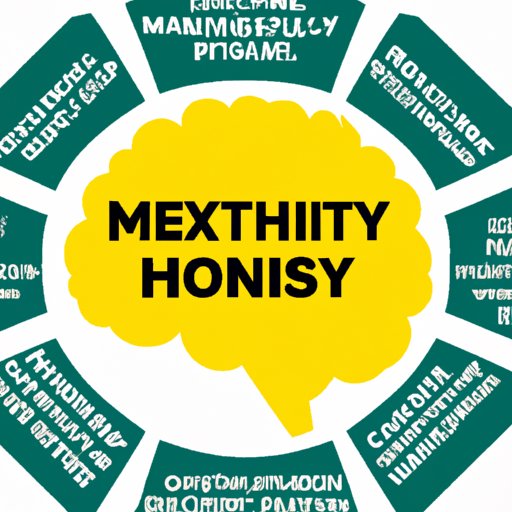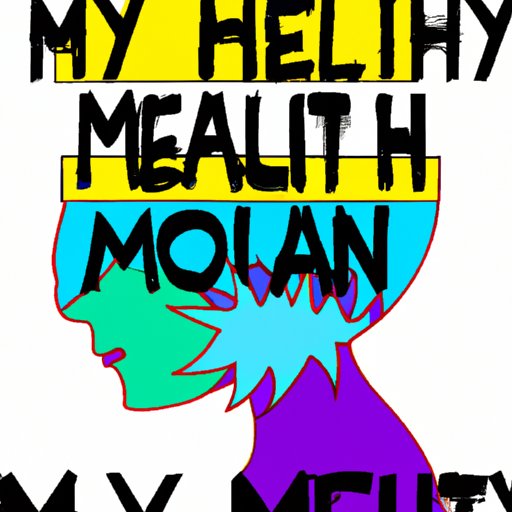Introduction
Mental health is a broad term that encompasses our psychological, emotional, and social wellbeing. It’s an important part of our overall health, as it affects how we think, feel, and act. Unfortunately, many people struggle with their mental health, leading to feelings of despair, hopelessness, and helplessness. In this article, we’ll explore why someone’s mental health might be so bad, as well as ways to improve it.
Exploring the Causes of Mental Health Decline
There are many potential causes of poor mental health, including stress and anxiety, poor diet and lack of exercise, social isolation, substance abuse, and trauma. Let’s take a closer look at each one.
Stress and Anxiety
Stress and anxiety can have a significant impact on mental health. Stress is the body’s response to a perceived threat, while anxiety is an intense fear or worry about something in the future. Both can lead to physical, cognitive, and emotional symptoms that can worsen over time if not addressed.
Poor Diet and Lack of Exercise
What we eat and how much we exercise can also have a big impact on our mental health. Eating a balanced diet that includes plenty of fruits and vegetables, lean proteins, and healthy fats can help boost mood and energy levels. Exercise, meanwhile, releases endorphins, which can help reduce stress and anxiety and improve sleep quality.
Social Isolation
Humans are social creatures, and loneliness and isolation can have a negative effect on our mental health. Having meaningful connections with others is essential for our emotional wellbeing, as it helps us feel supported and less alone. Connecting with family and friends, joining clubs or organizations, and volunteering can all help reduce feelings of loneliness.
Substance Abuse
Using drugs or alcohol to cope with stress or negative emotions can lead to serious problems with mental health. Substance abuse can cause changes in brain chemistry and make existing mental health issues worse. It can also lead to addiction, which can further impair mental health.
Trauma
Experiencing traumatic events can have a lasting impact on mental health. Trauma can cause changes in brain structure and function, as well as trigger physical, cognitive, and emotional responses. It can also lead to post-traumatic stress disorder (PTSD), a mental health condition characterized by flashbacks, nightmares, and intrusive thoughts.

Understanding the Impact of Stress and Anxiety on Mental Health
Stress and anxiety can have a wide range of physical, cognitive, and emotional effects on mental health. Common physical symptoms include headaches, fatigue, muscle tension, chest pain, and nausea. Cognitive symptoms include difficulty concentrating, racing thoughts, and feeling overwhelmed. Emotional symptoms include irritability, sadness, low self-esteem, and feelings of hopelessness.

Examining the Role of Diet and Exercise in Mental Health
Making positive lifestyle choices, such as eating a balanced diet and getting regular exercise, can help improve mental health. Eating a nutritious diet that includes plenty of fruits, vegetables, lean proteins, and healthy fats can provide the brain with the fuel it needs to function properly. Exercise, meanwhile, helps release endorphins, which can help reduce stress and anxiety and improve sleep quality.

Recognizing the Signs of Poor Mental Health
It’s important to be aware of the signs of poor mental health so that you can get help if needed. These signs can include changes in behavior, difficulty concentrating, low energy levels, loss of interest in activities, changes in sleep patterns, and changes in eating habits.
Exploring Ways to Improve Mental Well-Being
There are several things you can do to improve your mental health. Practicing meditation and mindfulness can help you manage stress and anxiety. Connecting with others through social activities can help reduce loneliness and isolation. Pursuing hobbies and interests can give you a sense of accomplishment and purpose. And taking care of yourself by getting enough sleep, eating a balanced diet, and exercising regularly can help improve your overall wellbeing.
Seeking Professional Help When Struggling with Mental Health
If you find that you’re struggling with your mental health, it’s important to seek professional help. There are a variety of treatments available, including cognitive behavioral therapy, psychotherapy, and medication. Finding a therapist or counselor who specializes in treating mental health issues can be beneficial. Therapy can help you learn coping strategies, understand underlying issues, and develop healthier ways of thinking and behaving.
Conclusion
Mental health is an important part of our overall wellbeing. This article explored some of the common causes of poor mental health, such as stress and anxiety, poor diet and lack of exercise, social isolation, substance abuse, and trauma. We also discussed ways to improve mental health, such as practicing meditation and mindfulness, connecting with others, pursuing hobbies and interests, and seeking professional help when needed. Finally, we encouraged readers to take action and seek help if they are struggling with their mental health.
(Note: Is this article not meeting your expectations? Do you have knowledge or insights to share? Unlock new opportunities and expand your reach by joining our authors team. Click Registration to join us and share your expertise with our readers.)
